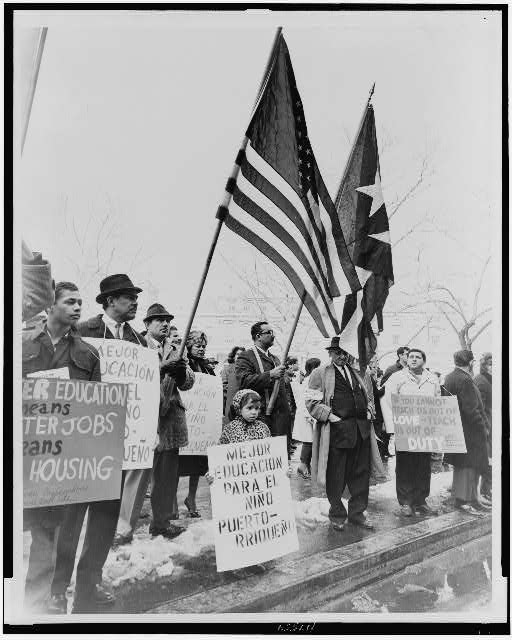
Date Created:
Place Created: Washington, D.C.
Year Created: 1966
Historical Theme:
Description: In the case of Katzenbach v. Morgan, the Supreme Court significantly affirmed Congress's power under Section 5 of the Fourteenth Amendment. This ruling established Congress's authority to expand individual rights beyond judicial recognition. Specifically, the Court upheld Section 4(e) of the Voting Rights Act of 1965, which exempted from English literacy tests those who had completed sixth grade in Puerto Rico. This decision reversed a lower court's injunction and introduced the 'ratchet theory' of congressional enforcement power. It asserted Congress's ability to expand constitutional rights.
Categories of Documents:
Syllabus
U.S. Supreme Court
Katzenbach v. Morgan, 384 U.S. 641 (1966)
Katzenbach v. Morgan
No. 847
Argued April 18, 1966
Decided June 13, 1966*
384 U.S. 641
Syllabus
Appellees, registered voters in New York City, brought this suit to challenge the constitutionality of § 4(e) of the Voting Rights Act of 1965 to the extent that the provision prohibits enforcement of the statutory requirement for literacy in English as applied to numerous New York City residents from Puerto Rico who, because of that requirement, had previously been denied the right to vote. Section 4(e) provides that no person who has completed the sixth grade in a public school, or an accredited private school, in Puerto Rico in which the language of instruction was other than English shall be disfranchised for inability to read or write English. A three-judge District Court granted appellees declaratory and injunctive relief, holding that, in enacting § 4(e), Congress had exceeded its powers.
Held: Section 4(e) is a proper exercise of the powers under § 5 of the Fourteenth Amendment, and, by virtue of the Supremacy Clause, New York's English literacy requirement cannot be enforced to the extent it conflicts with § 4(e). Pp. 384 U. S. 646-658.
(a) Though the States have power to fix voting qualifications, they cannot do so contrary to the Fourteenth Amendment or any other constitutional provision. P. 384 U. S. 647.
(b) Congress' power under § 5 of the Fourteenth Amendment to enact legislation prohibiting enforcement of a state law is not limited to situations where the state law has been adjudged to violate the provisions of the Amendment which Congress sought to enforce. It is therefore the Court's task here to determine not whether New York's English literacy requirement, as applied, violates the Equal Protection Clause, but whether § 4(e)'s prohibition against that requirement is "appropriate legislation" to enforce the Clause. Lassiter v. Northampton Election Bd., 360 U. S. 45, distinguished. Pp. 384 U. S. 648-650.
(c) Section 5 of the Fourteenth Amendment is a positive grant of legislative power authorizing Congress to exercise its discretion in determining the need for and nature of legislation to secure Fourteenth Amendment guarantees. The test of McCulloch v. Maryland, 4 Wheat. 316, 17 U. S. 421, is to be applied to determine whether a congressional enactment is "appropriate legislation" under § 5 of the Fourteenth Amendment. Pp. 384 U. S. 650-651.
(d) Section 4(e) was enacted to enforce the Equal Protection Clause as a measure to secure nondiscriminatory treatment by government for numerous Puerto Ricans residing in New York, both in the imposition of voting qualifications and the provision or administration of governmental services. Pp. 384 U. S. 652-653.
(e) Congress had an adequate basis for deciding that § 4(e) was plainly adapted to that end. Pp. 384 U. S. 653-656.
(f) Section 4(e) does not itself invidiously discriminate in violation of the Fifth Amendment for failure to extend relief to those educated in non-American flag schools. A reform measure such as § 4(e) is not invalid because Congress might have gone further than it did, and did not eliminate all the evil at the same time. Pp. 384 U. S. 656-658.
247 F. Supp. 196, reversed.
Web Address:
Washington, D.C.

